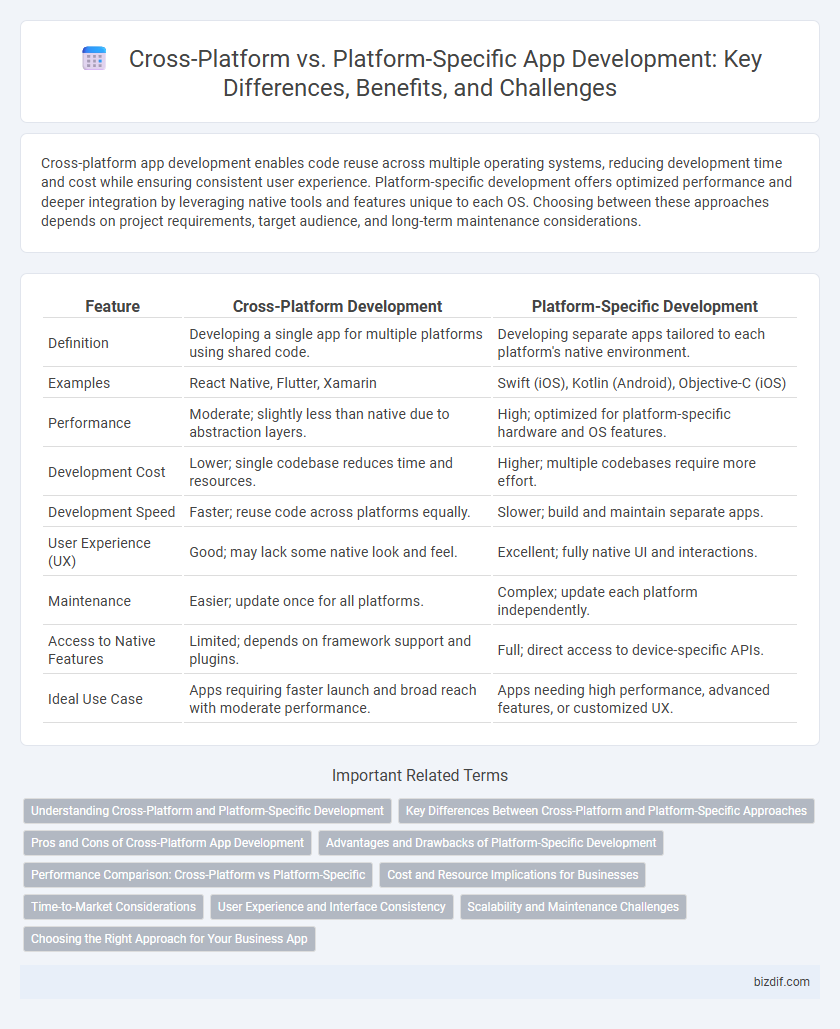Cross-platform app development enables code reuse across multiple operating systems, reducing development time and cost while ensuring consistent user experience. Platform-specific development offers optimized performance and deeper integration by leveraging native tools and features unique to each OS. Choosing between these approaches depends on project requirements, target audience, and long-term maintenance considerations.
Table of Comparison
| Feature | Cross-Platform Development | Platform-Specific Development |
|---|---|---|
| Definition | Developing a single app for multiple platforms using shared code. | Developing separate apps tailored to each platform's native environment. |
| Examples | React Native, Flutter, Xamarin | Swift (iOS), Kotlin (Android), Objective-C (iOS) |
| Performance | Moderate; slightly less than native due to abstraction layers. | High; optimized for platform-specific hardware and OS features. |
| Development Cost | Lower; single codebase reduces time and resources. | Higher; multiple codebases require more effort. |
| Development Speed | Faster; reuse code across platforms equally. | Slower; build and maintain separate apps. |
| User Experience (UX) | Good; may lack some native look and feel. | Excellent; fully native UI and interactions. |
| Maintenance | Easier; update once for all platforms. | Complex; update each platform independently. |
| Access to Native Features | Limited; depends on framework support and plugins. | Full; direct access to device-specific APIs. |
| Ideal Use Case | Apps requiring faster launch and broad reach with moderate performance. | Apps needing high performance, advanced features, or customized UX. |
Understanding Cross-Platform and Platform-Specific Development
Cross-platform development enables building apps compatible with multiple operating systems using a single codebase, significantly reducing development time and costs. Platform-specific development focuses on creating apps tailored for one operating system, such as iOS or Android, ensuring optimal performance and access to native device features. Choosing between these approaches depends on project requirements like user experience, budget, and timeline precision.
Key Differences Between Cross-Platform and Platform-Specific Approaches
Cross-platform app development enables code reuse across multiple operating systems using frameworks like React Native and Flutter, reducing development time and costs. Platform-specific development involves creating apps tailored to a single OS, such as iOS using Swift or Android using Kotlin, which allows for better performance and deeper access to native APIs. Key differences include development speed, user experience optimization, and maintenance complexity.
Pros and Cons of Cross-Platform App Development
Cross-platform app development offers the advantage of reduced development time and cost by allowing a single codebase to run on multiple operating systems such as iOS and Android. However, it may face performance limitations and less optimized user experience compared to platform-specific apps, which are tailored to leverage native device features. Developers must weigh the trade-offs between broader reach and potential compromises in app responsiveness and customization.
Advantages and Drawbacks of Platform-Specific Development
Platform-specific development enables optimized performance and seamless integration with device features by leveraging native languages like Swift for iOS or Kotlin for Android, resulting in a superior user experience. However, it requires separate codebases for each platform, increasing development time and maintenance costs compared to cross-platform solutions. The approach is ideal for applications demanding high efficiency, responsiveness, and platform-specific functionality but may delay time-to-market due to duplicated efforts.
Performance Comparison: Cross-Platform vs Platform-Specific
Cross-platform app development often sacrifices some performance due to abstraction layers, resulting in slower response times and limited access to device-specific features compared to platform-specific apps. Platform-specific apps leverage native APIs and optimized compilers, delivering superior speed, smoother animations, and lower memory usage. Performance benchmarks typically show platform-specific applications outperform cross-platform counterparts in CPU-intensive and graphics-heavy tasks.
Cost and Resource Implications for Businesses
Cross-platform app development significantly reduces costs and resource demands by enabling a single codebase to run on multiple operating systems, minimizing the need for separate development teams. Platform-specific development, while potentially offering deeper system integration and optimized performance, often requires higher investments in specialized resources and longer timelines due to the necessity to build and maintain distinct apps for each platform. Businesses must weigh budget constraints against performance goals when choosing between cross-platform and platform-specific approaches to app development.
Time-to-Market Considerations
Cross-platform app development significantly reduces time-to-market by enabling simultaneous deployment across multiple operating systems using a shared codebase. Platform-specific development demands more time due to the need for separate coding, testing, and optimization for each operating system like iOS and Android. Choosing cross-platform frameworks like Flutter or React Native accelerates launch timelines, making them ideal for startups and projects with tight deadlines.
User Experience and Interface Consistency
Cross-platform app development enables consistent user experience and interface across multiple devices by using shared codebases, ensuring uniform design and functionality. Platform-specific development, however, allows for deeper integration with device features and optimized performance tailored to each operating system's unique interfaces. Balancing these approaches depends on prioritizing either broad reach with interface consistency or enhanced user experience through customized native capabilities.
Scalability and Maintenance Challenges
Cross-platform app development offers scalability by allowing a single codebase to run on multiple operating systems, reducing development time and costs. However, maintenance can become complex due to dependencies on third-party frameworks and potential performance bottlenecks. Platform-specific development ensures optimized performance and easier integration with native features but requires separate maintenance efforts for each platform, increasing resource allocation.
Choosing the Right Approach for Your Business App
Selecting between cross-platform and platform-specific development depends on your business goals, budget, and target audience. Cross-platform frameworks like Flutter and React Native enable faster development and broader reach by using a single codebase for both iOS and Android, while platform-specific development offers superior performance and user experience tailored to each operating system. Evaluating factors such as app complexity, maintenance costs, and required features ensures the optimal approach for maximizing ROI and user engagement.
Cross-Platform vs Platform-Specific Infographic

 bizdif.com
bizdif.com